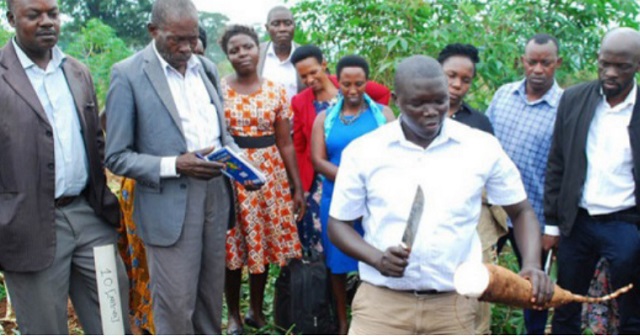
Now scientists plot new law after Museveni sat on old one
Kampala, Uganda | ISAAC KHISA | For years Ugandan scientists have been trying to figure out how various crops can be made to respond to numerous challenges – drought, pests and diseases.
Dr. Godfrey Asea is one of them. A maize breeder, with his team at the National Crop Resources Institute, Namulonge, he has been researching on genetically modified maize commonly referred to as GM maize for more than 10 years.
Asea’s team and scientists from six African countries have developed hybrid GM maize they say is tolerant to drought. The scientists from Uganda, Kenya, Tanzania, Ethiopia, Mozambique and South Africa are supported by the Nairobi, Kenya–based African Agricultural Technology Foundation’s Water Efficient Maize for Africa (WEMA) Project.
They also introduced Bacillus Thuringiensis (BT), a naturally occurring soil bacterium that protects crops against pests to the ‘new’ maize to create resistance to two main pests: stem borer and fall armyworm.
“We completed those trials for drought and inset resistant maize two years ago, and the data confirmed that the technology works for these two problems but unfortunately we cannot go to the next step; that is the application for environmental release which requires operational frameworks to be in place,” Asea told The Independent in an interview.
He was referring to the stalled biotech law even after parliament passed the Genetic Engineering Bill.
Currently, GM research in Uganda is carried out under the biosafety regulations or guidelines approved by the Uganda National Council for Science and Technology. However, there’s no law that regulates the use and commercialisation of GM products.
Dr. Asea says they had to stop the research and destroy all the materials because they don’t have capacity for long term storage in fridges or cold rooms yet.
Lost opportunities
He said Uganda has lost many opportunities from the technology.
“A lot of resources and time have been put in these researches and now the products can’t reach the farmers. Yet drought and insects are continuing to be a problem.” “Off course, it is frustrating but…what do we do now?” he said.
Dr. Asea added that restarting a similar research in future will now mean acquiring materials released in the sister countries currently participating in the research.
The Independent’s investigation shows that a similar fate befell more GM crops; soybean, cotton, potatoes and rice.
Dr. Charles Mugoya, the chairperson, National Biosafety Committee at the Uganda National Council for Science and Technology says the absence of the biotech law affects the morale of researchers because ideally research is expected to lead to tangible products.
He, however, says the country has been reluctant to embrace the technology because research is being done on crops still providing some food to the population.
“But all these crops are growing in hardships…the government does not know that if there were varieties that resists those diseases, the country would benefit more,” he said.
An official of the Uganda National Bureau of Standards (UNBS) told The Independent that absence of the biotech law means the country is also not able to regulate import of GMO products.
“The absence of the law is a challenge at this point because you cannot regulate something that is not backed by law,” the executive said on condition of anonymity adding that attempting to block their entry can result into lawsuits.
“This means that GMO products will easily enter the country,” the executive said. This situation has made a section of scientists to either abandon GM research infavour of non-GM research activities at the National Agriculture Research Organisation (NARO) or secured jobs in other African countries and abroad.
Dr. Barbara Zawedde, a 2011 Borlaug LEAP fellow, a GM crop researcher and Senior Knowledge Management and Biosafety Officer at Namulonge is now a director at Mukono Zonal Agricultural Research and Development Institute (MuZARDI).
Dr. Tendo Ssali, a banana breeder at National Agricultural Research Laboratories – Kawanda and Dr. Julius Ecuru, the former Deputy Executive Director at the Uganda National Council for Science and Technology (UNCST) left their jobs to pursue other juicer jobs outside the country since 2017.
Dr. Ssali reportedly joined the International Potatoe centre (CIP) based in the Peruvian capital Lima, while Dr. Ecuru joined the Nairobi-based International Centre of Insect Physiology and Ecology (ICIPE).
Dr. Andrew Kiggundu, who was Principal Research Officer, Head of Programme, Biodiversity and Biotechnology at the NARL, Kawanda, and now a project manager, Virus Resistant Cassava at the Donald Danforth Plant Science Center, a top research firm based in the State of Missouri in the United States, told The Independent that his organisation which now funds cassava research globally is finding it difficult to fund the crop’s research in Uganda.
 The Independent Uganda: You get the Truth we Pay the Price
The Independent Uganda: You get the Truth we Pay the Price



wonderful points altogether, you simply received a new reader.
What would you recommend about your post that you just made some
days in the past? Any certain?
There’s definately a great deal to find out
about this subject. I like all of the points you made.